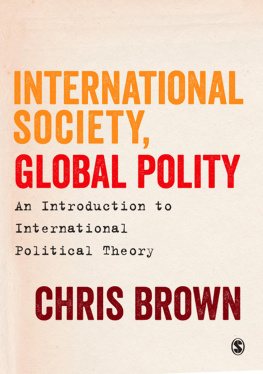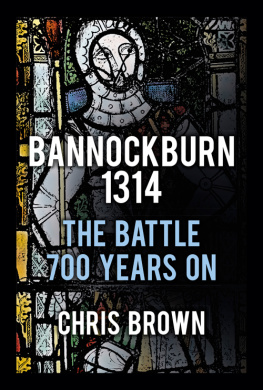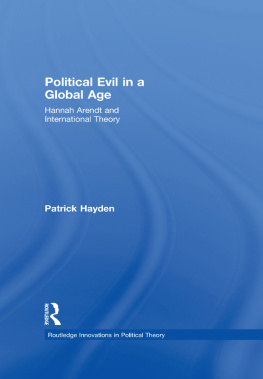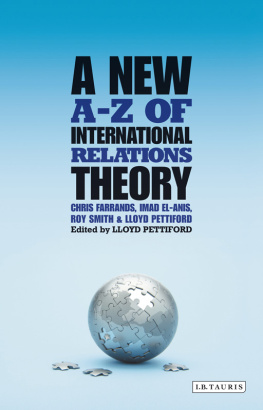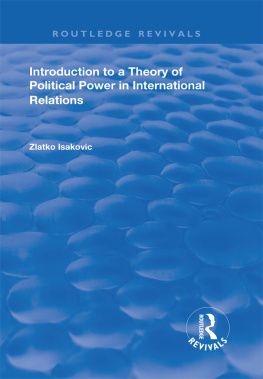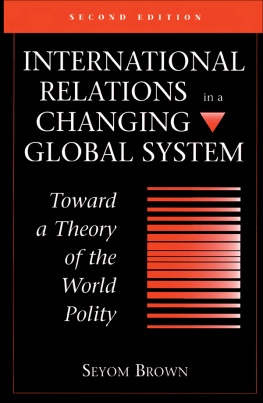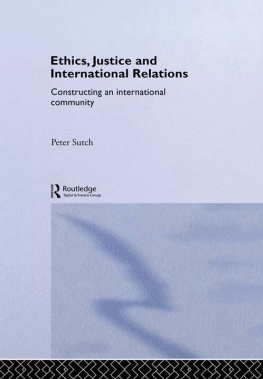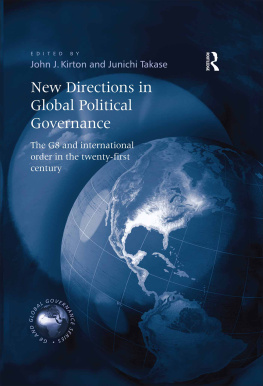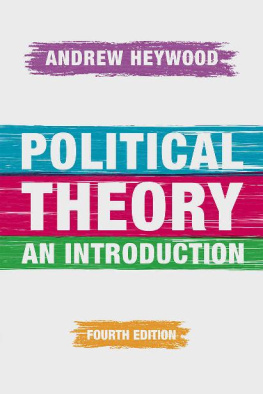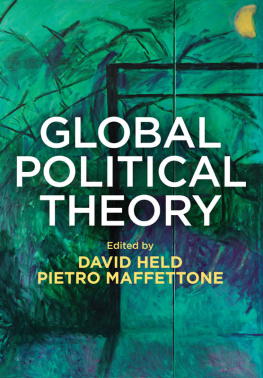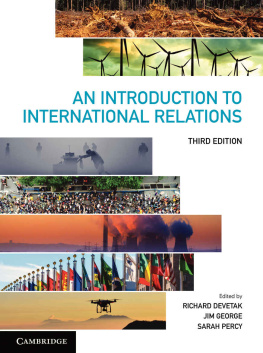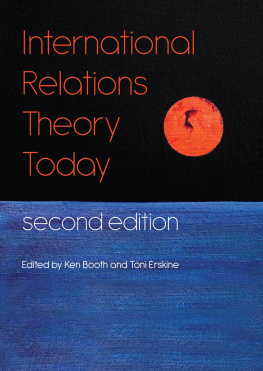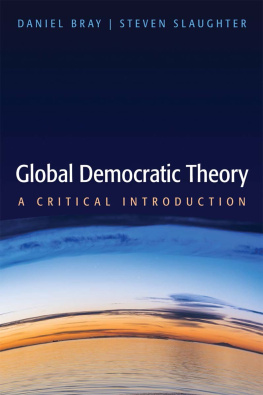International Society, Global Polity
SAGE was founded in 1965 by Sara Miller McCune to support the dissemination of usable knowledge by publishing innovative and high-quality research and teaching content. Today, we publish more than 750 journals, including those of more than 300 learned societies, more than 800 new books per year, and a growing range of library products including archives, data, case studies, reports, conference highlights, and video. SAGE remains majority-owned by our founder, and on her passing will become owned by a charitable trust that secures our continued independence.
Los Angeles | London | Washington DC | New Delhi | Singapore
International Society, Global Polity
An Introduction to International Political Theory
SAGE Publications Ltd
1 Oliver's Yard
55 City Road
London EC1Y 1SP
SAGE Publications Inc.
2455 Teller Road
Thousand Oaks, California 91320
SAGE Publications India Pvt Ltd
B 1/I 1 Mohan Cooperative Industrial Area
Mathura Road
New Delhi 110 044
SAGE Publications Asia-Pacific Pte Ltd
3 Church Street
#10-04 Samsung Hub
Singapore 049483
Chris Brown 2015
First published 2015
Apart from any fair dealing for the purposes of research or private study, or criticism or review, as permitted under the Copyright, Designs and Patents Act, 1988, this publication may be reproduced, stored or transmitted in any form, or by any means, only with the prior permission in writing of the publishers, or in the case of reprographic reproduction, in accordance with the terms of licences issued by the Copyright Licensing Agency. Enquiries concerning reproduction outside those terms should be sent to the publishers.
Library of Congress Control Number: 2014941631
British Library Cataloguing in Publication data
A catalogue record for this book is available from the British Library
ISBN 978-1-4462-7282-4
ISBN 978-1-4462-7283-1 (pbk)
Editor: Natalie Aguilera
Assistant Editor: James Piper
Production editor: Katie Forsythe
Copyeditor: Clare Weaver
Proofreader: Imogen Roome
Marketing manager: Sally Ransom
Cover design: Francis Kenney
Typeset by: C&M Digitals (P) Ltd, Chennai, India
Printed in Great Britain by Henry Ling Limited at The Dorset Press, Dorchester, DT1 1HD
About the Author
Chris Brownis Emeritus Professor of International Relations at the London School of Economics and Political Science. An LSE graduate (BSc (Econ) International Relations, 1968), he returned to the Department of International Relations at the School as Professor in 1998 and retired in 2014. He held the Chair of Politics at Southampton University from 199498, and before that was a Lecturer and then Senior Lecturer at the University of Kent at Canterbury. He is the author of numerous articles and book chapters on international political theory and of
Practical Judgement in International Political Theory (2010),
Sovereignty, Rights and Justice (2002),
International Relations Theory: New Normative Approaches (1992), editor of
Political Restructuring in Europe: Ethical Perspectives (1994) and co-editor (with Terry Nardin and N.J. Rengger) of
International Relations in Political Thought (2002). His textbook
Understanding International Relations (2009) is now in its 4th and final edition and has been translated into Arabic, Chinese. Portuguese and Turkish. He was Chair of the British International Studies Association from 19982000.
Preface
This book can be, and I hope will be, read in different ways. On the one hand it presents a particular reading of the shifts that have taken place, and are taking place, in the normative framework of international relations, summarised here as a putative movement from seeing the world as an international society, to seeing the world as a global polity. On the other hand, it can be, and I hope will be, used by students of international political theory to develop their own reading of this shift, or perhaps to reject the very idea that such a shift is taking place. These two objectives are not incompatible. In my experience teaching this subject over two and a half decades students want their teachers, and the books they recommend, to have views and to be willing to share them always provided that they are open to hearing other opinions and provide the means by which different takes on the subject can be developed. Since this is a book that expresses a particular view of the world, it is written with minimal referencing in order not to disturb the flow of the text, but since I want to give plenty of opportunities for the reader to develop his or her own views, each chapter is followed by a guide to further reading.
Acknowledgements
I have been writing on these topics for longer than I care to think, and a certain amount of auto-plagiarism is, I think, inevitable there are only so many ways one can outline Rawls's Law of Peoples in a paragraph or two, and I have employed all of them over the last 15 years. Specific borrowings that are worth noting appear in which draw on Chris Brown (2013a) Just War and political judgment in Anthony Lang, Cian O'Driscoll and John Williams, and an unpublished paper written in honour of Jean Bethke Elshtain.
I am grateful to a number of friends and colleagues at LSE, Aberystwyth University and St Andrews University for many conversations over the years on the topics discussed here I must identify by name Toni Erskine, Tony Lang and Nick Rengger but there are many, many others without whose input this would be a different and much weaker book. My students at LSE on IR306, IR462 and IR463 will recognise much that is on offer here I have tried out everything that this book has to offer on them, and it is a better book as a result; I'm very grateful, and to Elke Schwarz for help with the bibliography. Last, but not least, Natalie Aguilera has been an exemplary editor, always supportive, likewise James Piper, Katie Forsythe, Sally Ransom, Clare Weaver and all the Sage team.
Introduction to the Study of International Political Theory
Realist International Relations theorists tell us that international politics is about states, power and interest and there is no reason to believe that this is not the case, but one of the founding principles of all the different variants of International Political Theory that will be examined in this book is that this is not the whole story. International politics is also about values and norms, and states are not always the most significant international actors. Another belief of International Relations theorists this time liberal as well as realist is that the discipline of International Relations is a twentieth-century construct, generated by the two World Wars. Again practitioners of International Political Theory do not deny that as a university discipline, International Relations emerged after 1918, and re-emerged, revitalised after 1945, but they also hold that thinking about topics that we now call international has a long and deep history. Conventional International Relations theorists acknowledge the existence of a few forerunners to their discourse Thucydides, Machiavelli, perhaps Hobbes and Kant but International Political Theory draws on a much wider intellectual constellation, including many thinkers who are not obviously international as that term has come to be understood in modern times (Brown et al., 2002). To summarise these differences, for International Relations scholars, their discipline is either a sub-field of contemporary Political Science (the dominant American view) or a cross-disciplinary focus informed by history, philosophy and law (the characteristic British view) but for International Political Theory, the study of the international is an exercise in Applied Political Philosophy. Just what kind of an exercise is the subject matter of this book, and this introductory chapter is designed to set the scene for what is to come, expanding these programmatic statements, clearing away some misunderstandings and confusions, and identifying key issues.





